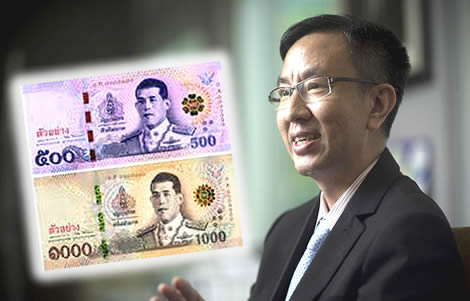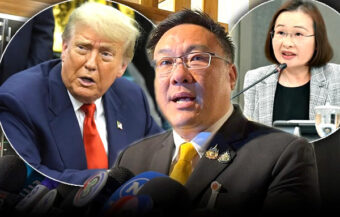The underlying financial good health of Thailand’s currency and a continued flight of capital into the country will pose a growing dilemma for the soon to be installed Thai government as the Thai baht punches way above the level that is conducive to the overall good of the economy as well as the financial prospects of ordinary Thai people and trade.

A senior official at The Bank of Thailand this week suggested that Thailand could still be open to an interest rate cut this year. This comes as there is increasing pressure to act as the phenomenal strength of the Thai baht sees it emerge as one of the world’s strongest currencies with a surge in inward funds into Thailand. The impact of this and the worldwide slow down in trade caused by the US-China trade war has caused Thai consumer sentiment to drop for the fourth month in a row. A drop also in inflation, a benefit of a strong baht, may also help support the case for an interest rate reduction as there are distinct signs that the collapse in export growth is feeding into the economy at ground level.
A senior figure working with the Bank of Thailand said this week that it would be wrong to rule out the prospect of an interest rate cut this year in Thailand. Don Nakornthab made the remark at an economics seminar hosted by KBank Private Banking. Mr Nakornthab is a director of the economic and policy department at Thailand’s central bank.
Growing public concern on the economy and a probable contraction of exports
The Bank of Thailand official referenced the growing consensus, following May’s disastrous export figures, that export in Thailand will contract this year. This has subsequently been followed by data showing growing uncertainty among the Thai public about economic conditions even as capital inflows into the country boom.
The slowdown in inflation in Thailand from May to June this year, falling for 1.15% to 0.87% may also help support such an interest rate reduction move when viewed with falling confidence and expectation levels from June in key consumer surveys.
Sentiment amongst the Thai people down in June for the fourth month in a row
A combination of political uncertainty and dismal economic data have driven down the consumer confidence index in June from 64.8 to 63.4. It is a significant drop and the fourth in a row. Sentiment has now reached the lowest level since October 2017. The figures are recorded by the Centre of Economics and Business Forecasting which is associated with the Thai Chamber of Commerce.
Thai men and women less certain of income and job prospects as political uncertainty returns
More worryingly, the data is also showing an easing of confidence among job seekers in finding employment falling from 73.3 to 72.2 from May to June this year. A similar fall was seen in the confidence index related to future income. This fell from 95 down to 93.5 in the same period driven by a slew of negative news reports on the economic and political front. It is hoped that the new Thai government, currently being put in place this month, will coincide with better economic data at the end of August as Thailand comes to terms with a slower world economy and a higher-priced baht
Thai baht is the hottest currency ticket for global and Asian traders right now
The problem for Thailand is the emergence of the Thai baht as the hot ticket worldwide for Asian and global investors parking funds or hedging their position against global uncertainty and lack of direction from the United States where the Federal Reserve and the bullish US president are engaged in a struggle on the future direction of US interest rates. This will be determined by the performance of the US economy but US President Donald Trump has made his view known that he wants to see lower interest rates.
Baht even edges out the Japanese yen
The Thai baht has even edged out the Japanese Yen as investors are attracted to the strong financial position underpinning the currency while also viewing Thailand as still an emerging market with an upside. The Thai baht is also Asia’s best-performing currency this year gaining over 6.3% against the dollar.
Commentators urge the Thai government to move on infrastructural plans while baht is strong
Some Thai commentators are urging the Thai government to take advantage of the strong baht to push infrastructural investment and spending. This is expected to happen in due course once the new Thai government and relevant ministers take up their roles. One key area for infrastructure investment is the Eastern corridor in Thailand and its connections to the Chinese market. This week, the Thai prime minister heralded inward investment into the area as a key opportunity for both Thailand and China.
Inflow of funds into Thailand continued unabated in June as the economy slowed down
The inflow of funds into Thailand continues unabated. In June, it is reported that nearly ฿44 billion came from offshore to be invested in Thai stocks listed on the SET stock exchange. A senior vice president of the SET said this week that this trend should continue particularly if there is some easing of US-China trade tensions even with the existing tariffs and an emerging trend for US interest rates to move down. This prediction, however, could be fraught with a stronger US economic performance and a ratcheting up of US tariffs which the US president has always warned about. Stronger US economic indicators would see the Fed probably revert to its current holding position or even become hawkish.
SET and the alternative market now valued at ฿18 trillion with a 3% hike in May
The impressive performance of the SET, however, is in direct comparison to the underlying worry creeping in among the public in Thailand. The stock market has gained a massive 11% since the end of the year. The SET and the Market for Alternative Investment are now valued at over ฿18 trillion. June alone saw figures up over 3% from May.
Leading Thai firms hedging against further baht movements for imports and exports
Many leading Thai firms are now using the strong baht to hedge against future trade. This even includes some exporters as the Thai baht is still expected to make gains into next year. This may also change when the economic data for exports is reviewed again in August. A continued deterioration in export performance will see strong pressure for an interest rate cut and any reasonable action the Thai government can take to assist exporters. Some are calling, even at this stage, for drastic action.
Thailand’s Bank of Ayudhya predicts the dollar to ฿30 to be broken early next year
Based on the current figures, Thailand’s Bank of Ayudhya predicted this week that the Thai baht will break through the value of 30 baht to the dollar at the beginning of next year in the first quarter. The bank’s forecast sees the currency trading at 29.50 in the second quarter. All this is dependent on the interest rate environment in the United States. The US president recently nominated two appointments to the Federal Reserve who are known to be dovish in their outlook and not chained to conventional thinking which would suggest that a hotter US economy should prompt interest rate rises.
US Fed chairman a key player in Thai baht’s future path as policy in the US in a hold position
However, US Fed Chairman Jerome Powell has shown himself to be robustly independent. The best hope for Thailand’s export sector and the general economy, and it is still very much an outlier right now, would be a ragingly successful US economy and higher US interest rates driving funds back stateside and a higher dollar. However, financial experts on Wall Street are predicting now an easing of Fed interest rates by 25 basis points and consequently a weaker dollar. Either way, we may still see inward investment into Thailand as the US market for Thai exports is strong showing a nearly 9% gain in May, the only bright spot in an overall dismal report. Indeed, many of the Chinese and global companies considering new investment in Thailand are targeting the United States from Thailand to avoid the new punitive US trade tariffs with China.
Battle of the baht will be fundamental this year
The core factor in Thailand’s economic performance right now is the phenomenal strength of the Thai baht. It is, in fact, well-founded after decades of prudent management by successive Thai governments. The country has a large current account surplus and significant international reserves of ฿210 billion. It is an intolerable dilemma for Thai authorities who are still hoping that a rebound in world economic trade will come to their assistance. But even if this happens, it still may perhaps be not enough. At some point, it is quite possible that Thai authorities will have to act and jettison the role of polite Mr nice guy on the world stage.


















